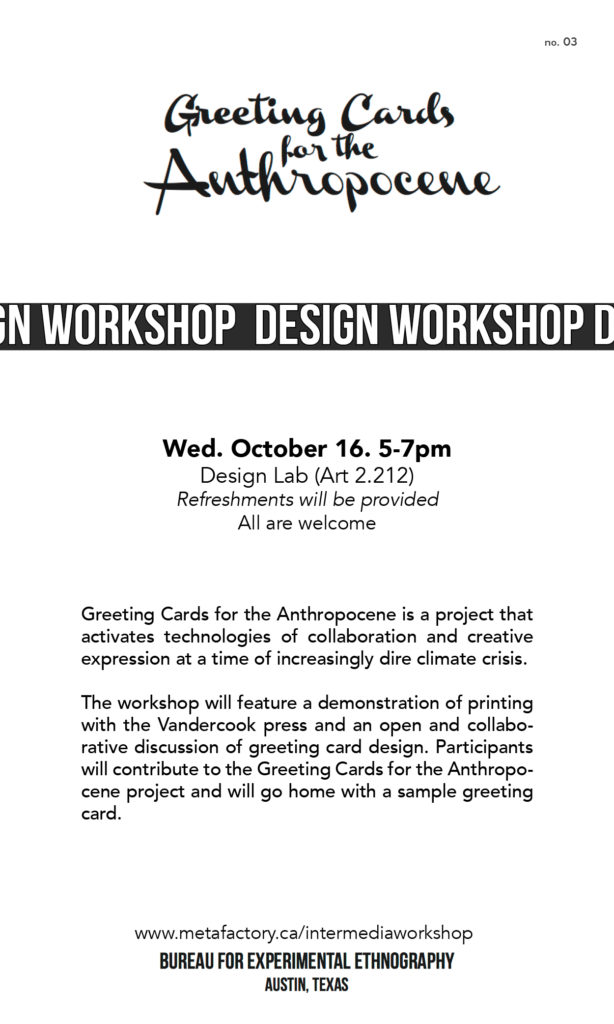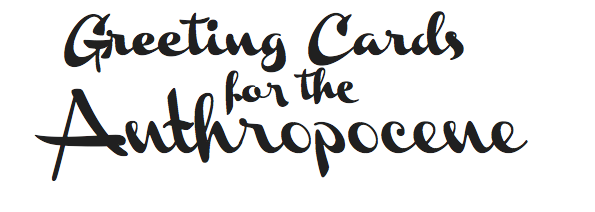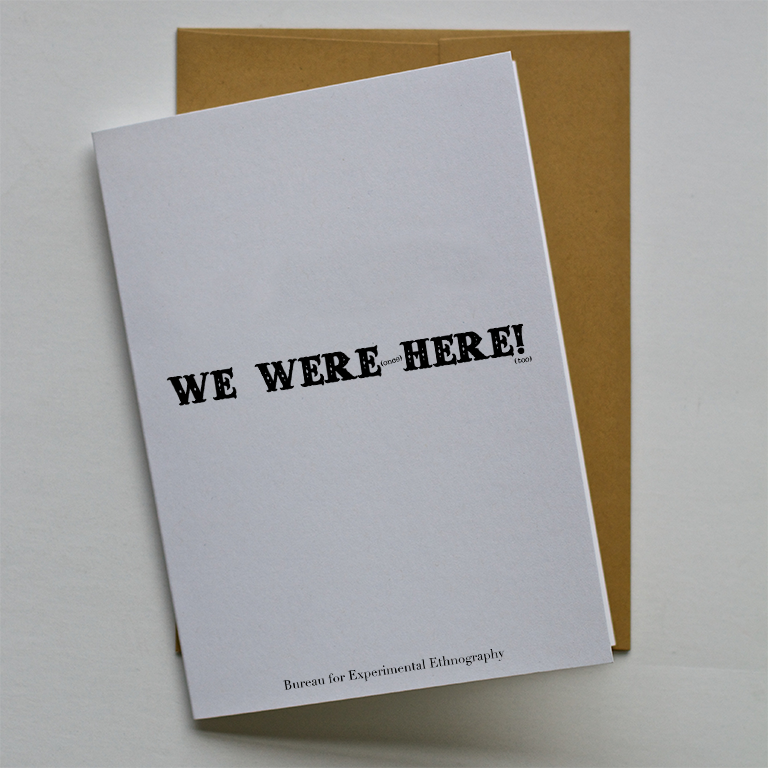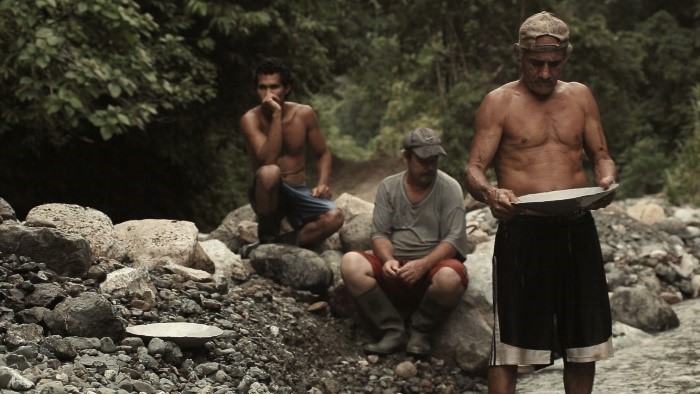Please note that I have moved most of my activities related to the Intermedia Workshop to the collaborative initiative called the Bureau for Experimental Ethnography.
-Craig
Please note that I have moved most of my activities related to the Intermedia Workshop to the collaborative initiative called the Bureau for Experimental Ethnography.
-Craig
We are delighted to officially launch the Bureau for Experimental Ethnography (BEE) with a series of events this fall.
Every other Monday from 10-11:30 a.m. we will have an open Zoom meeting to share works in progress, discuss readings, and watch or listen together.
October 5 from 10-11:30 a.m., we will discuss a New Yorker article about Sara Hendren’s recent book What Can a Body Do? How We Meet the Built World in anticipation of her Oct. 6 talk, sponsored by the Digital Writing ad Research Lab.
Email Marina Peterson (marina.peterson@austin.utexas.edu) for the Zoom link.
October 6 at 3 p.m.: Talk by Sara Hendren (Olin College of Engineering), DWRL
November 12 at 12 p.m.: Talk by Nina Sun Eidsheim (UCLA) in the Sound Studies Lecture Series.
We are also planning a film series and a webinar series on digital writing.
Click here to subscribe to direct email updates from the Bureau for Experimental Ethnography.
You can also visit our Facebook page.
Greeting Cards for the Anthropocene presents its final design workshop for the year. With special guest, Dr. Natalie Loveless—Associate Professor of Contemporary Art and Theory at the University of Alberta.
Dr. Natalie Loveless
5-7pm | Nov. 14, 2019
Design Lab (Art 2.212)
Food and drink will be provided
Greeting Cards for the Anthropocene is a project that activates technologies of collaboration and creative expression at a time of increasingly dire climate crisis.
The workshop will feature a demonstration of printing with the Vandercook press and an open and collaborative discussion of greeting card design. Dr. Loveless will talk about her work with Fluxus forms and we’ll see examples of already-completed greeting cards. Participants will contribute to the Greeting Cards for the Anthropocene project and will go home with a sample greeting card.
The Bureau has organized a field trip to the Jones Center (downtown Austin) to visit the current exhibition at the Austin Contemporary: The Sorcerer’s Burden: Contemporary Art and the Anthropological Turn.
Assistant Curator, Robin Williams will introduce the exhibition to us and give us a guided tour.
Ok, not exactly a book club but a reading group. Greeting Cards for the Anthropocene is exploring the meaning of greeting one another in this time of anthropogenic climate change. Among a variety of workshops, we host occasional meetings of an open reading group. Our next book club meeting we’ll be reading an article by a linguistic anthropologist, Alexandra Jaffe. Her article in the Journal of Material Culture “analyzes the social uses and meanings of greeting cards. [arguing] that cards occupy an intermediate and shifting place in between the opposing social categories of ‘gift’ vs. ‘commodity’.” (Jaffe 1999).
12:30 – 1:30pm on Thursday, October 31st
*Price of admission is reading the article and coming, prepared to talk through it. Lunch will be provided for those who RSVP in advance (we’ll probably order from Taco Deli, so send dietary preferences).
Jaffe, Alexandra. 1999. “Packaged Sentiments: The Social Meanings of Greeting Cards.” Journal of Material Culture 4 (2): 115–141. Download: jaffe1999

Greeting Cards for the Anthropocene invites you to it’s third event. This design workshop will be focused on design process in creating the greeting cards.
The workshop will feature a demonstration of printing with the Vandercook letterpress and an open and collaborative discussion of greeting card design. Participants will contribute to the Greeting Cards for the Anthropocene project and will go home with a sample greeting card.
Monday, Sept. 16th
11am-1pm ~ Parlin 102 Digital Writing and Research Lab
Open house
Greeting Cards for the Anthropocene is preparing to begin work on creating a set of unique hand printed greeting cards designed to function as little interventions against forces of ecological annihilation.
This week we launch a series of activities to continue exploring the composition and design of greeting cards. This open house is an opportunity to learn more about the project, to meet project coordinators, to make and compose your own greetings, and to learn how you can participate. Refreshments will be served.
This project is coordinated under the auspices of the Bureau for Experimental Ethnography in collaboration with the Dig- ital Writing & Research Lab and the School of Design and Creative Technologies’ Design Lab. With support from Planet Texas 2050.


Tuesday, Sept. 10th
11am-noon ~ SAC 5.162
Information Session
Greeting Cards for the Anthropocene is preparing to begin work on creating a set of unique hand printed greeting cards designed to function as little interventions against forces of ecological annihilation.
This information session invites those who are directly interested in participating in the research and design of this project. This is also an opportunity to learn more about the project, to meet project coordinators, and to learn how you can participate. Refreshments will be served.
This project is coordinated under the auspices of the Bureau for Experimental Ethnography in collaboration with the Digital Writing & Research Lab and the School of Design and Creative Technologies’ Design Lab. With support from Planet Texas 2050.

Invited guest Keith Murphy (University of California, Irvine) has assigned some readings on typography. He will open the workshop with a short discussion of typography and anthropology. We then take these ideas and put them to work in our project catalyst: the greeting card. The theme for these greeting cards is the Anthropocene. The workshop will feature hands-on experience with type and printing press.
RSVP: Craig Campbell [craig.campbell@utexas.edu]
All participants are asked to read (or at least familiarize yourselves with) the recommended readings. You are also asked to begin the work of composing some greeting cards. Please come to the workshop with at least three greetings that could be used [Tips for Writers (from the Greeting Card Association)]. We will collectively discuss the greetings and choose a few of them to set with manual type and run through the letterpress. Each participant will go home with a greeting card.
Primary focus should be given to those readings marked with a star*
Chua, Liana, and Hannah Fair. 2019. “Anthropocene.” Cambridge Encyclopedia of Anthropology, January. https://www.anthroencyclopedia.com/entry/anthropocene.
D’Angelo, Frank. 1992. “The Rhetoric of Sentimental Greeting Card Verse.” Rhetoric Review 10 (2): 337–345.
Jaffe, Alexandra. 1999. “Packaged Sentiments: The Social Meanings of Greeting Cards.” Journal of Material Culture 4 (2): 115–141.
*Murphy, Keith M. 2017. “Fontroversy! Or, How to Care about the Shape of Language.” In Language and Materiality: Ethnographic and Theoretical Explorations, edited by Jillian R. Cavanaugh and Shalini Shankar, 63–86. Cambridge University Press.
*Van Leeuwen, Theo. 2005. “Typographic Meaning.” Visual Communication 4 (2): 137–143.
Documentary filmmaker and photographer Alvaro Torres-Crespo will be visiting UT Austin from April 23-25, 2019. Alvaro will be leading a photography masterclass, screening his film We the Stones at the Alamo Drafthouse (Mueller), and present and lead a masterclass discussion of his film at UT.
Nosotros Las Piedras – We the Stones
(2018, 71min. documentary film, English Subtitles)
Even though the Government expelled them from their lands in the name of ecologic preservation 40 years ago, a group of panners keep searching the rivers for gold, in Costa Rica’s jungle. Their living as modern pariahs shows their fight for survivance, and questions the country’s conservationist fame.

This documentary examines the daily life of a group of people who have been routinely invisibilized. The little that we know about Costa Rican gold miners comes from tendentious news stories that paint them to be enemies of the environment, which in the national imaginary is the equivalent of everyone’s worst enemy. The objective of “Nosotros Las Piedras” is not to idealize the gold miners or to create an aura of anthropological sentimentalism around these men and women, but rather to reflect their current condition: they are modern pariahs in a region where the Costa Rican government prioritizes environmental protection, tourism and the real estate market. The gold miners don’t fit into this equation and are under the constant threat of expulsion and neglect.
Despite their condition, we recognize the gold miners to be fighters, with histories filled not just with resignation, exhaustion and nostalgia but also with vitality, pride and optimism. Attempting to reflect this fighter’s spirit is one of the primary objectives of this documentary.
The intimate approach implicit to this project facilitates the humanization of this group of individuals: they are complex, passionate, overflowing with desires and fears. The project’s director has already developed a relationship with a sizable number of gold miners, having spent long stretches of time with them. This allows for greater depth in our exploration of the gold miners’ daily work, and therefore of their realities and the social, economic and political dynamics that intersect in the Costa Rican Pacific South.
The first audiovisual component of the film is precisely that intimate observational portrait of these individuals: the act of gold mining, their illegal expeditions into protected areas, their time spent together at night, the intense and conflictive camaraderie, their way of speaking, their way of understanding the world. The close-knit relationship formed between the director and his crew and the documentary’s protagonists guarantees that we will be present for the most personal moments.
The second structural component is a concrete narrative line: the struggle of the protagonists and supporting characters to organize themselves as a community in order to stand up to the government at such as critical moment, the way in which the government itself implements their directive to expel the gold miners, and the uncertain future of the gold miners once they are expelled from Corcovado. It is worth mentioning that one of the gold miners belongs to a group that is organizing through legal channels to fight for fair compensation from the government. This second narrative line will include meetings and discussions among the gold miners, possible confrontations with park rangers, public council meetings with members of government, and visits with their lawyer.
The general objective of the film is to attempt to contribute to an understanding of the human condition through the power of observation, to invite the audience into a world that for many is only accessible through film. It is also an opportunity to deconstruct the imaginary imposed by the federal government and the majority of mass media outlets. Film as a force to create new meanings.
April 23, 2-4pm
UT Austin, Dept. of Anthropology
Limited seating available for this masterclass in documentary photography led by Costa Rican photographer and filmmaker, Alvaro Torres Crespo.
Space is limited, RSVP necessary (craig.campbell@utexas.edu)
April 24, 7pm
Alamo Drafthouse, Mueller
A screening of the film Nosotros Las Piedras (We the Stones) followed by questions and answers with the director. Tickets will cost $5.
Nosotros Las Piedras [We the Stones]
April 25, 4pm
BMC 5.102 – Dean’s Office Presentation Room
UT Austin Screening and Masterclass (limited seating)
Space is limited to UT Students, staff, and faculty
RSVP necessary (craig.campbell@utexas.edu)
This event is sponsored by the Department of Anthropology, The College of Liberal Arts (Public Affairs), and the Teresa Lozano Long Institute for Latin American Studies.